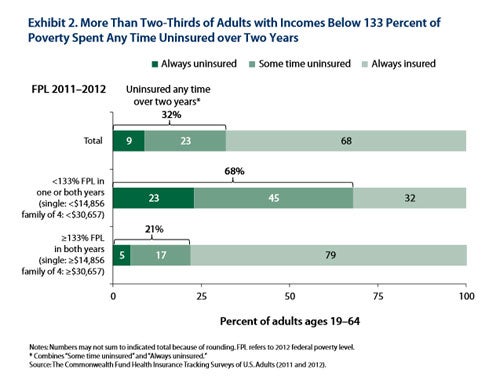Liberal Group Makes the Case Against Obamacare
Chris Jacobs /
Yesterday, the Commonwealth Fund released a report attempting to argue that low-income individuals will benefit if states expand their Medicaid programs under Obamacare. But in reality, the study made a more effective case against Obamacare than it did in favor of the law.
The Commonwealth report’s most revealing evidence comes in Exhibit 2, reproduced below. According to Commonwealth’s own survey data, fewer than one in 10 (9 percent) of Americans were always uninsured during the period 2011-2012. Among adults with incomes above 133 percent of the poverty level (just under $15,000 for a single person), only one in 20 (5 percent) Americans lacked health insurance for all of 2011 and 2012.
It’s a point worth emphasizing again: During a two-year period following the most severe economic downturn in generations, fewer than one in 10 Americans consistently lacked health insurance coverage. And some portion of that 9 percent consists of non-citizens, who are ineligible for most taxpayer-funded assistance programs anyway.
All of which raises the obvious question: Did it really require a 2,700-page bill, more than 20,000 pages of regulations, $1 trillion in tax increases, and massive dislocation in insurance markets to “solve” a problem affecting a relatively small percentage of Americans…? The answer is obvious: It did not—at least not if the focus was on reforming the health system, as opposed to expanding government power.
The Commonwealth survey does indicate that a larger percentage of individuals—nearly one in four (23 percent) Americans—experienced some period without health insurance during a two-year period. That suggests that policymakers can and should do more to make insurance portable, particularly as individuals move from job to job.
But the Commonwealth study actually undermines the case for Obamacare, including the law’s costly expansion of the ineffective Medicaid program. The survey data demonstrate how the law is a massive, government-centric overkill of the problems in our health care system—the equivalent of killing an ant with a cruise missile—which is why Congress should stop the law now before it takes root.

